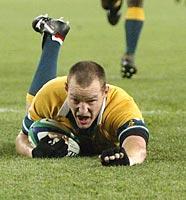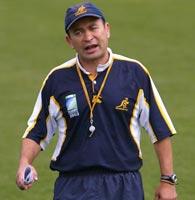
Home > Sports > News > Reuters > Report
Australia's timing is perfect again
Julian Linden in Sydney |
November 17, 2003 22:21 IST
Last Updated: November 17, 2003 22:25 IST
Timing is everything in professional sport and Australia have once again set the standard in rugby union.  They have fewer players and less money than most of their big rivals, but they continue to win the games that matter through a combination of careful planning and split-second accuracy. They have fewer players and less money than most of their big rivals, but they continue to win the games that matter through a combination of careful planning and split-second accuracy.
Saturday's 22-10 World Cup semi-final win over New Zealand was not the surprise that everyone thought, but the result of a perfectly executed plan that was two years in the making. After surprising their critics by winning the 1999 World Cup, the Wallabies went from strength to strength, winning back-to-back Tri-nations titles and beating just about everyone in sight. But reality hit home during the 2001 tour by the British and Irish Lions. Australia lost the first Test and although they recovered to win the series 2-1, an important lesson had been learned. Coach Rod MacQueen retired immediately after the series, handing over the reins to Eddie Jones to give him at least two years to start preparing for the World Cup.  | Rugby World Cup 2003 SFs |  | |
|
Australia's inspirational captain John Eales also hung up his boots after that season's Tri-nations series, allowing scrumhalf George Gregan to take over the on-field leadership.
Aware that the rest of the world had suddenly caught up with them, the Wallabies began to widen their net in search of fresh talent. Wendell Sailor and Mat Rogers, two of the stars of the Australian team that won the 2000 Rugby League World Cup, switched codes in a blaze of publicity and pots of money. They were joined a year later by Lote Tuqiri, another league international. Few were convinced about the merits of recruiting from the 13 man code as the Wallabies began to slide, losing the Tri-nations title to New Zealand in 2002.  Worse was to come this year. Not only did New Zealand win the Tri-nations again, they also snatched the Bledisloe Cup from Australia by beating them home and away and the Wallabies suffered their first loss ever on home soil to England. Worse was to come this year. Not only did New Zealand win the Tri-nations again, they also snatched the Bledisloe Cup from Australia by beating them home and away and the Wallabies suffered their first loss ever on home soil to England.
Things did not look any rosier when they began their defence of the World Cup. Australia clawed their way to victory over Argentina in the opening game of the tournament, then held on grimly to beat Ireland by a point to finish on top of pool A after routing Romania and Namibia. They were booed off the pitch at half-time in their quarter-final against Scotland in Brisbane after the teams went to the interval level at 9-9, but regained their composure after the break to win 33-16. The signs were not good when they lined up against New Zealand in Saturday's semi-final. The tournament favourites had crushed Australia 50-21 at the same Olympic Stadium four months earlier, then held on to beat them 21-17 in Auckland in August. But, just as they had done so often in the past, the Wallabies were ready to pounce when least expected. They were always confident they would play New Zealand in the semi-finals, so had been saving everything for that game.  | More from the World Cup |  | |
|
Jones, who said the tournament would be won not by the best team but by the smartest, had detected weaknesses in New Zealand's game during the Tri-nations and was waiting for the perfect time to exploit them.
"We learned a lot from that game at Eden Park, about how to play against New Zealand, and we have sought to build a game that we thought we could play against New Zealand and win," he said. "It gave us a fair bit of confidence going into our break for the World Cup, so it was a blueprint of how we wanted to play." Photographs: Getty Images
|